White Wings "Immortal Regiment"
Mystic, probably ... It seems to me that the departed from us flew over the city streets in flocks of white cranes, about which a song touching to the very core of the soul was composed. This invisible spiritual union of the past and the present has merged into a single powerful impulse. On this day, they did not hide the photographs of their grandfathers and great-grandfathers, and proudly carried them along the main street of the city. "It seems to me sometimes that the soldiers, / From the bloody fields that did not come, / It was not once fallen into the land, / And they turned into white cranes."
Waves of people, one after another, one after another, built into the clones of the "Immortal Regiment", in Rostov-on-Don is becoming more and more.
In order to have time to build, you had to get up early, hours in the morning 6-7, and to 8.00 to be on the square named after Karl Marx. One by one they came here one by one and whole families. Several generations are lined up in 22 columns per person. At the head of the column is the standard bearer. At the head of his column, Aleksey Razumovsky unfolded a copy of the Victory banner hoisted over the Reichstag by the 3 fighting army. The red-burgundy cloth unfolded gently and, caught by the wind, spread out over Alexey's head. He kept looking up, he liked that calm rustle of the banner.
Oh my God! Every hour people more and more. It is said that about 50 00 participants are expected. Every year, there are more and more people who want to participate in the “Immortal Regiment” action: last year around 20 000 Rostovites took part in the march, and this year they were joined by various youth movements. A surprise for many was the appearance of motorcycles with red flags, which started from Karl Marx Square and led the movement on Sovetskaya Street and drove to Theater Square.
They were followed by the first row, "wrapped" in a wide red stripe of fabric, where they wrote in huge white letters: "IMMORTAL POLAND. ROSTOV-ON-DON.
My grandfather. My father, my great-great-grandfather. These words are the very first in the stories of all people when you ask them whom they bear in their hands. Past are people with signs: Bogdanov Akim Kuzmich, Gusak Ivan Kirillovich, Brechko Georgy Mikhailovich. It seems that there are already several thousand. And there is no way to immediately embrace the entire rebel commemorative army. And it is necessary, it is necessary to preserve and put together these priceless old women stories each family that became one in 1941-1945.
I can hardly find Alexander Pavlovich Stasyuk. The wind blew his gray hair, and his eyes were always so determined filled with some special, indescribable feeling. It is pride, it is joy, it is a feeling of belonging to a great past.
Alexander Pavlovich brought two portraits - the mother and his grandfather. His mother Nadezhda Stasyuk was a member of the youth resistance "Young Guard" in Krasnodon, survived all the military occupation and was able to stay alive to give the light of life to her child.
A grandfather, Senior Lieutenant Stasyuk Vasily Dmitrievich, for his heroic participation in the battles under the Dnieper was awarded the title Hero of the Soviet Union.
- My father, Stepchenko Grigory Illarionovich, was a military intelligence officer. More 25 times he was thrown into the rear of the enemy, and he miraculously survived. One can only wonder at his ability to fight. Within eight months after the start of World War II, he underwent accelerated training at a special school SMERSH located in Moscow and was sent to the Transcaucasian Front, from 1942 to 1943, commanded the sabotage group of the Transcaucasian Military District, said his son Viktor Stepchenko, engineer -constructor of bridges and tunnels. - In fact, I learned the military biography of my father from a military ID. But we understand that basically such records were made with the purpose of covering up the real activity of SMERSH intelligence officers. His father was from Kazakhstan, and he fought near Rostov and Taganrog. He talked little about the past days. But he always said that to win you need to have a “cold” head, clearly calculate the strengths and weaknesses of the enemy, be able to navigate in a difficult situation in time. One day, while performing a regular combat mission, a group of scouts was captured. They were able to escape at night: they got out, as the father said, through a pipe, and were able to stay alive to cause irreparable damage to the enemy. My father knew many different methods of hand-to-hand combat, showed them to us. He was very disciplined all his life, collected, worked up to 85 years, except for the main work, he headed the council of veterans.
- My grandfather, Martyukhin Dmitry Stefanovich, 1913, born, was called up from Rostov to the marines. My grandmother received the last letter in 1943, and it came from under Kerch, ”said Olga Arsenovna Chernaya. - Grandpa didn't write about the war. I remember the lines: "Dear Elena Kirillovna, your husband writes to you." He went to the front when his daughter, my mother, was only eight months old. He could not stop looking at her. We had to fight. His photograph in the form of a soldier of the Navy today we brought to the square. How young he is here!
Olga Arsenovna has a soldier's cap on her head, in her hands she squeezes a pole, on which a photograph of her grandfather is firmly fixed, and at the top two red flags with victorious St. George ribbons are attached. They fall on a portrait of a young young man in a sailor uniform, cover him a little, and then again show the world his bright, kind face.
- They went to the front boys. Do not share, did not live. But we have in our hearts such gratitude to them, such gratitude, which is difficult to convey. When you see a continuous stream of the same photos, tears involuntarily catch their eyes, - says Artem, the son of Olga Arsenovna, standing nearby.
On the street are two officers in the Soviet field uniform - "Afghans". Oleg Mikhailovich Muratov served in Afghanistan in the third battalion of the 56 th air assault brigade (then he was transferred to the 70 brigade). In his hand gathered together at once six people. On the big photo in the first row - female portraits. Below - men. “This is my grandfather and his two brothers. Grandfather Khudyakov Ivan Vasilyevich, 1915 of birth year and his middle brother Vyacheslav, 1917 of birth year died on the fronts of the war. But Gregory, 1919, was born three wars - Karelian-Finnish, Great Patriotic, and Khalkhin-Gol - and survived. ”
But here loud, solemn music sounds, and we are urged to build in columns. A lot of them. Familiar trying to get together and go in orderly rows, repeating those military ranks that formed the soldiers.
Three women go near.
“My father, Grigory Kuzmich Gorozheyev, in 1942 received a heavy concussion near Leningrad and was commissioned; for many years he worked at the Rostselmash plant,” said Zorozhei Gorozheeva, who continued her labor dynasty and also worked at the combine-building plant. - Father did not like to remember the war. But he loved Victory Day. I love this day and me. Being in the ranks just like my father once was, it is difficult for me to convey my feelings to those who gave us the Victory, this joy of life and happiness.
Marina Salikhova, an otolaryngologist at a military polyclinic at Voedved, proudly tells that her grandfather, Vasily Grigorievich Proklin, fought near Kherson in the naval brigade, was seriously injured, lost his leg, and since 1943, he performed his civic duty to restore the destroyed of the city of Rostov, and then worked at the Rostselmash plant.
- I am overwhelmed with emotions. Such pride! Our grandfather! Here it is, with us in the ranks! - says Marina. “And my great-uncle fought in our family at Stalingrad.” We are talking now about what they, often at the cost of their lives, gave us life. That we live under a peaceful sky.
“And my grandfather, Vlasenko Petr Abramovich, was an infantryman on the war fronts and defended Rostov, and twice, when the city was occupied by the Germans,” said Karina Zhukova.
Three women are removed along with the column, their figures are lost in the crowd, but the highly raised portraits are still seen and floating along with everyone, as if in the sea, swaying and quietly trembling with unaccustomed: many portraits are carried by children.
Don writer Fyodor Herman carefully holds in his hand a portrait of his older brother. He did not fix it, like many on the pole, but simply carried it in his hand as if he were once holding the big hand of an older brother.
- You see, he did not live two weeks before his twentieth birthday. And he went to the front at the very beginning of the war as a volunteer, smashing the Germans as part of the 1-th Sevastopol Order of the Suvorov Guards Division. Of course, they liberated Sevastopol, who was able to endure the 250 days of the German blockade, then was abandoned by our troops and was again released. My brother, Alexander Trofimovich Herman, reached the Seelow Heights. 15 April 1945, we received from him the last letter. As his fellow soldiers told us later, the Germans opened the Kingston, the subway quickly filled with water, and there were a lot of civilians. And our Russian soldiers rushed to save German children and women. Here, apparently, the brother, saving them, and died.
To go to the "Immortal Regiment", whole families gathered together in one day. Natalya Pavlovna Semenova, her husband Vladimir Anatolyevich and son Pavel, whom they by unanimous decision named after their grandfather. Pavel Semenov, who was drafted into the army in 1939, had a happy military fate. This fate began with the fact that the commanders noticed the talented recruit and sent him to study for officer courses, which he graduated in eight months. Having received an order to appear on June 22 of the year 1941 at his outpost, arrived at the appointed time. 22 June he approached his outpost on the western front, and it was already broken. Retreat. And they went to the front - Western, Voronezh, the second Ukrainian. Released Vienna, Budapest, Hungary, Austria. And after that he returned to his native outpost, where the war began. Here is a circle of life. But even after the war, it was necessary to defend the interests of the state, protecting the civilian population from the Bandera gangs. After demobilization, he was sent to Rostov in the communist direction to restore peaceful life, then worked as a shift supervisor at the Rostov bakery No. XXUMX. Today, unfortunately, it is not in the world. But they, his descendants, are in this world.
His daughter Natalya Pavlovna says that she always felt a sense of pride. But on this day, it is especially overwhelmed by the happiness of belonging to the great one that was succeeded in accomplishing it by the father and the soldiers of the Great Patriotic War. They were able to grow up in a country free from fascism, learn and raise their children. Natalia Pavlovna graduated from the Rostov Pedagogical Institute.
“The feeling of patriotism is the greatest,” she says.
The Dragilev family, Peter and Natalia, together with their young son, came here, holding three photographs in their hands. For more than one year they have been purposefully looking for their dead relatives, recognizing the smallest nuances of their military destiny.
- My grandfather, Sidorenko Ivan Karpovich, commander tank T-34, fought on the first Belorussian front, ”said Peter Dragilev. - He started the war on the Mius Front, not far from Rostov. He was wounded in the chest. After the hospital, until 1945 he fought well. And on the outskirts of Berlin he was shot in the jaw: a single shot rang out from the ruins, apparently, some unfinished German shot. He aimed at the head - a bullet hit the back of the head and came out through the cheek. Grandfather was seriously injured, but survived. And here is his own brother, Sidorenko Anton Karpovich, a sergeant. He died on the second day of the war, June 23, 1941, while being reconnaissance in the area of Nurets station.
- My great-grandfather, Krylov Semen Ivanovich, in September 1942, was captured and died from the humiliation of the Germans. He was buried in Ukraine near the city of Kamenetz-Podolsk. Unfortunately, we cannot go there today, ”adds Natalia Dragileva. “My grandmother’s brother, Ivan Mitrofanovich Kovalenko, died in our family, and Kovalenko’s second brother, Joseph, was lucky to stay alive.
The immortality of this national regiment is that today both young and old are joining its ranks. The Stadnik family, Olya's mom and Dad Vyacheslav, led three daughters: Barbara (five years old), Fevronia (2,9 year), Xenia (1 year). Their great-grandfather Nikolai Stadnyk in 1942, received a heavy concussion, was commissioned and restored the national economy, he had eight children. The fifth son asked him: “Why did you bother us so much?” “Much men beat at the war, there were few people, so I’m trying for everyone,” said the father.
Olga Stadnik told about her grandfather, who fought on the Belarusian front.
- Unfortunately, Sipovich Viktor Nikolaevich died before my birth. But the stories of the grandmother are clearly remembered: Elena Makarovna Kranokutskaya (nee Selivanova) drove shells on the lorry, fell repeatedly under the bombing, but returned unscathed from the front.
“My grandfather, Guards Junior Sergeant Mikhail Ivanovich Metyolkin, who stormed Berlin, had seven children after the war,” says his great-granddaughter Ekaterina Kononova. - I take part in the action "Immortal Regiment" a second time to pay tribute to the memory, to say thank you for walking the earth.
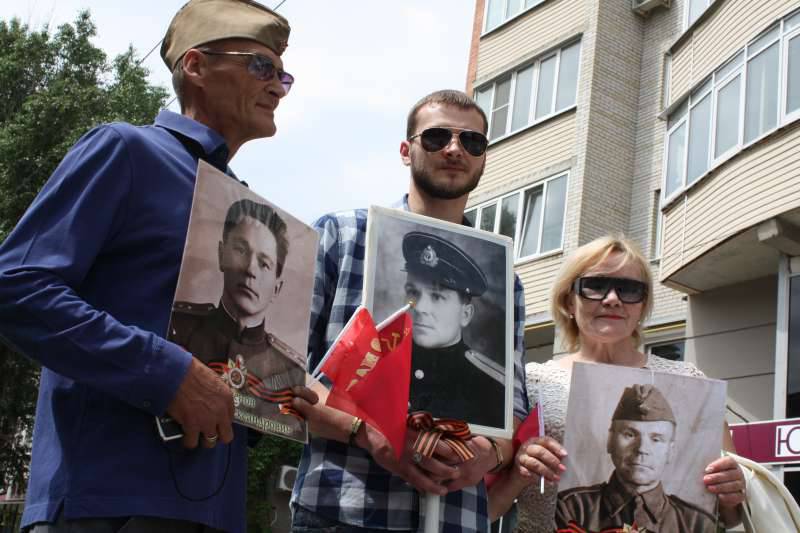
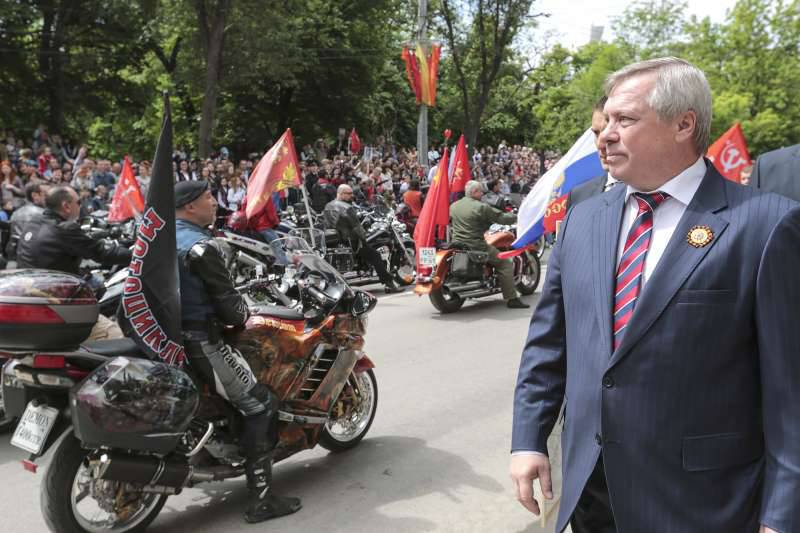
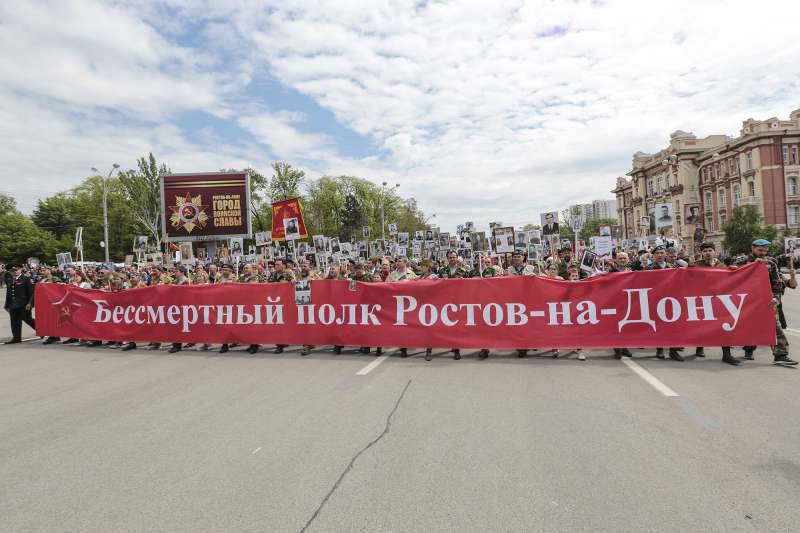
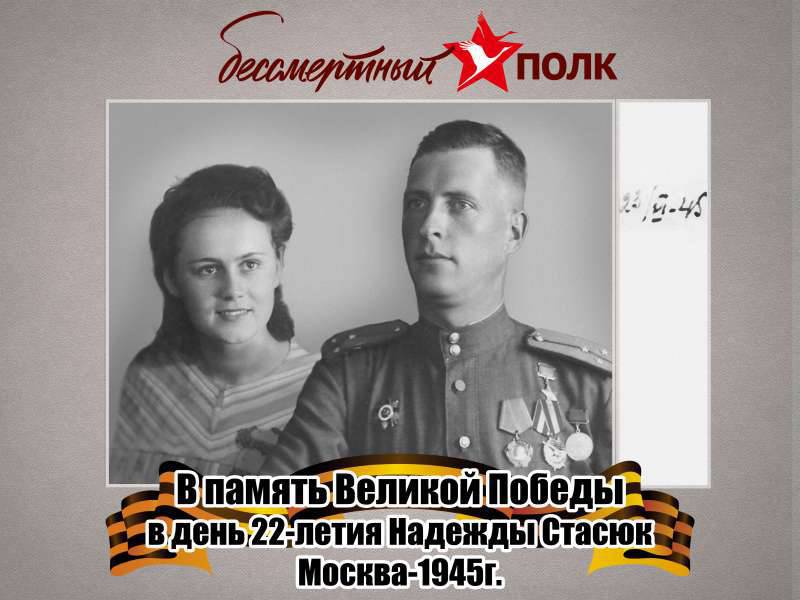
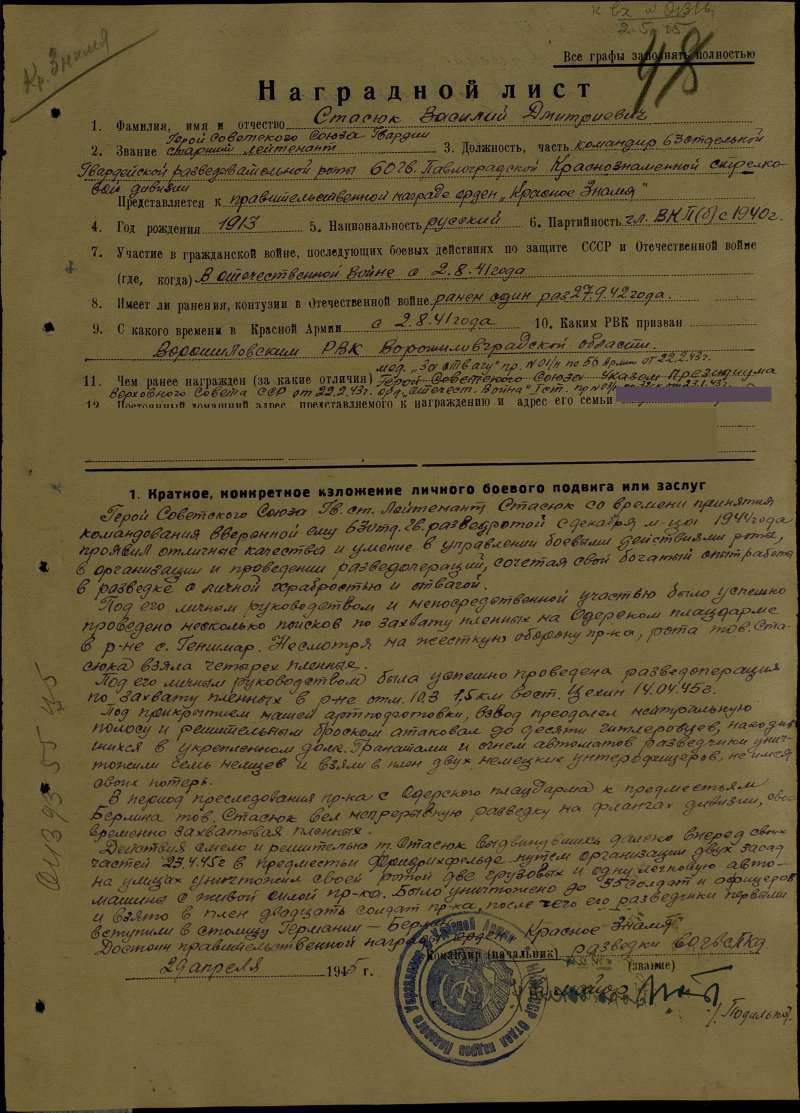
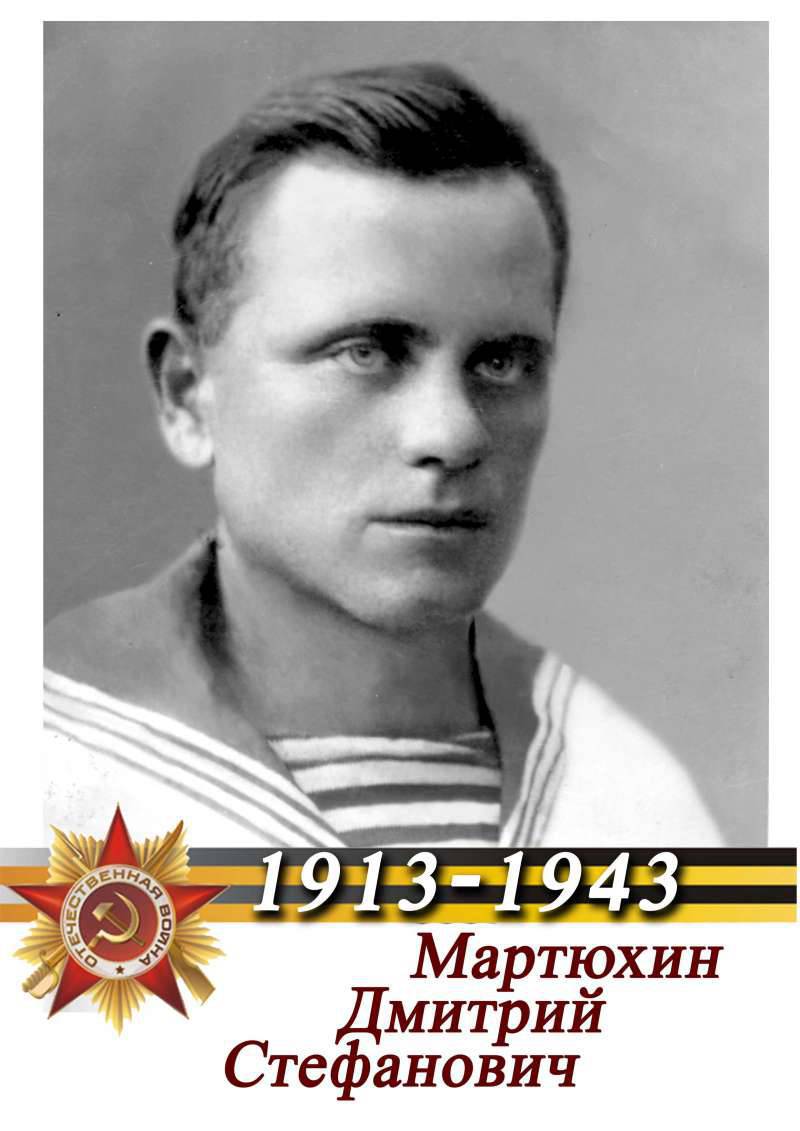
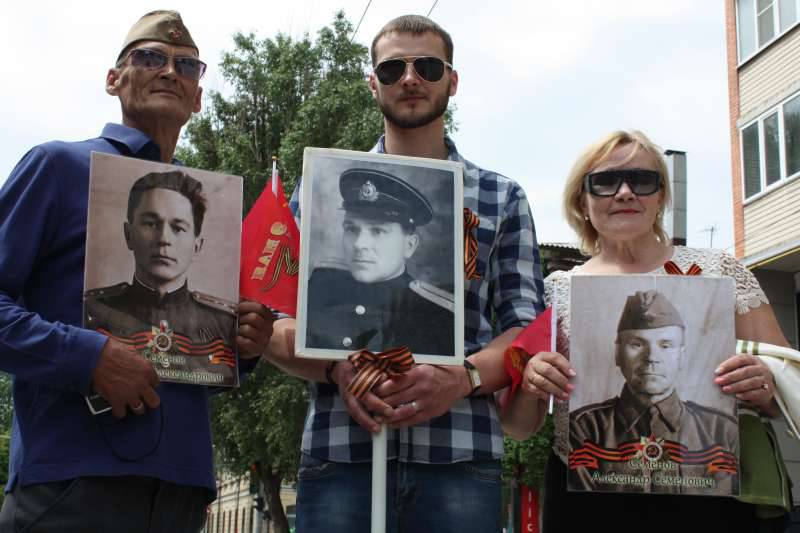
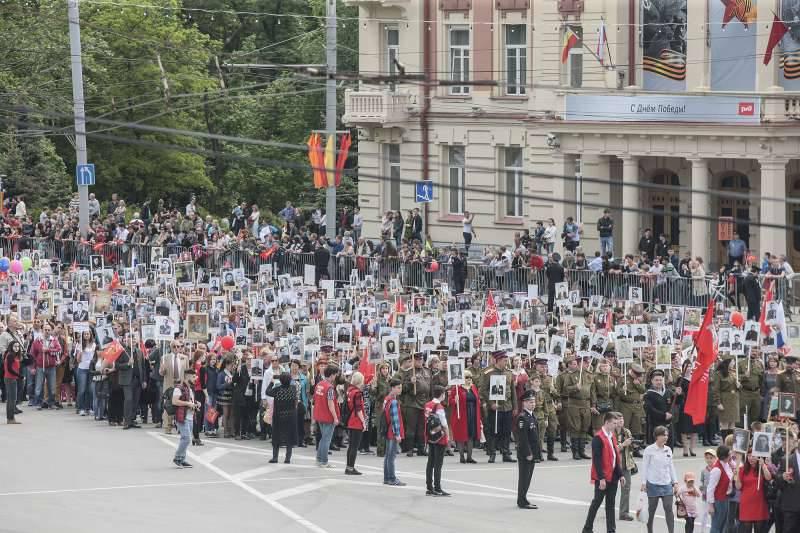
Information